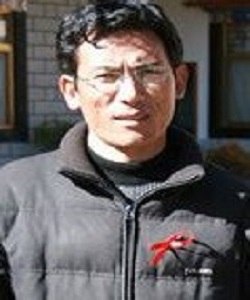AIDS awareness campaigner Wangdu received a life sentence in December 2008 for sending an email about witnessing crackdowns on Tibetan protesters. He was charged with espionage and providing intelligence to the so-called ‘Dalai Clique’.
This term is used in government propaganda claiming that the Dalai Lama is attempting to split China by controlling protests within Tibet. Five other Tibetans were sentenced to between ten and 15 years on similar charges.

Wangdu
HARSH SENTENCES
Wangdu worked on an HIV/AIDS prevention project and had been promoting AIDS awareness in Tibet since 2001.
Fellow detainee Migmar Dhondup, who specialised in conservationist projects, received a 14-year sentence for espionage.
The defendants admitted the charges, but violence may have secured confessions.
PREVIOUS DETENTION
Once a monk in Jokhang monastery, Wangdu had spent eight years in prison after being arrested in 1989, following protests that took place in Lhasa that year. His sentence was extended after he signed a petition condemning as unlawful an agreement which Tibetans were forced to sign during the Chinese invasion in 1950.
His current detention began on 14 March 2008.
ILLEGAL ACTIVITIES
Phuntsog Dorjee and Tsewang Dorjee, who were accused of helping Wangdu send information out of Tibet, were given nine and eight-year sentences respectively, and three others were charged with crimes relating to their own contact with NGOs.
The state reported that Sonam Tseten was sentenced to ten years for “illegally sending intelligence abroad”, Yeshi Choedon received a 15-year sentence for her alleged role in “providing intelligence to the Dalai Clique’s security department” and Sonam Dakpa ten years for “being a member of the Tibetan Youth Congress and sending information abroad”.
LOCATION UNKNOWN
The whereabouts of Wangdu and the other prisoners is unknown, and there are serious fears for their safety in a prison system where torture is both widespread and routine.

